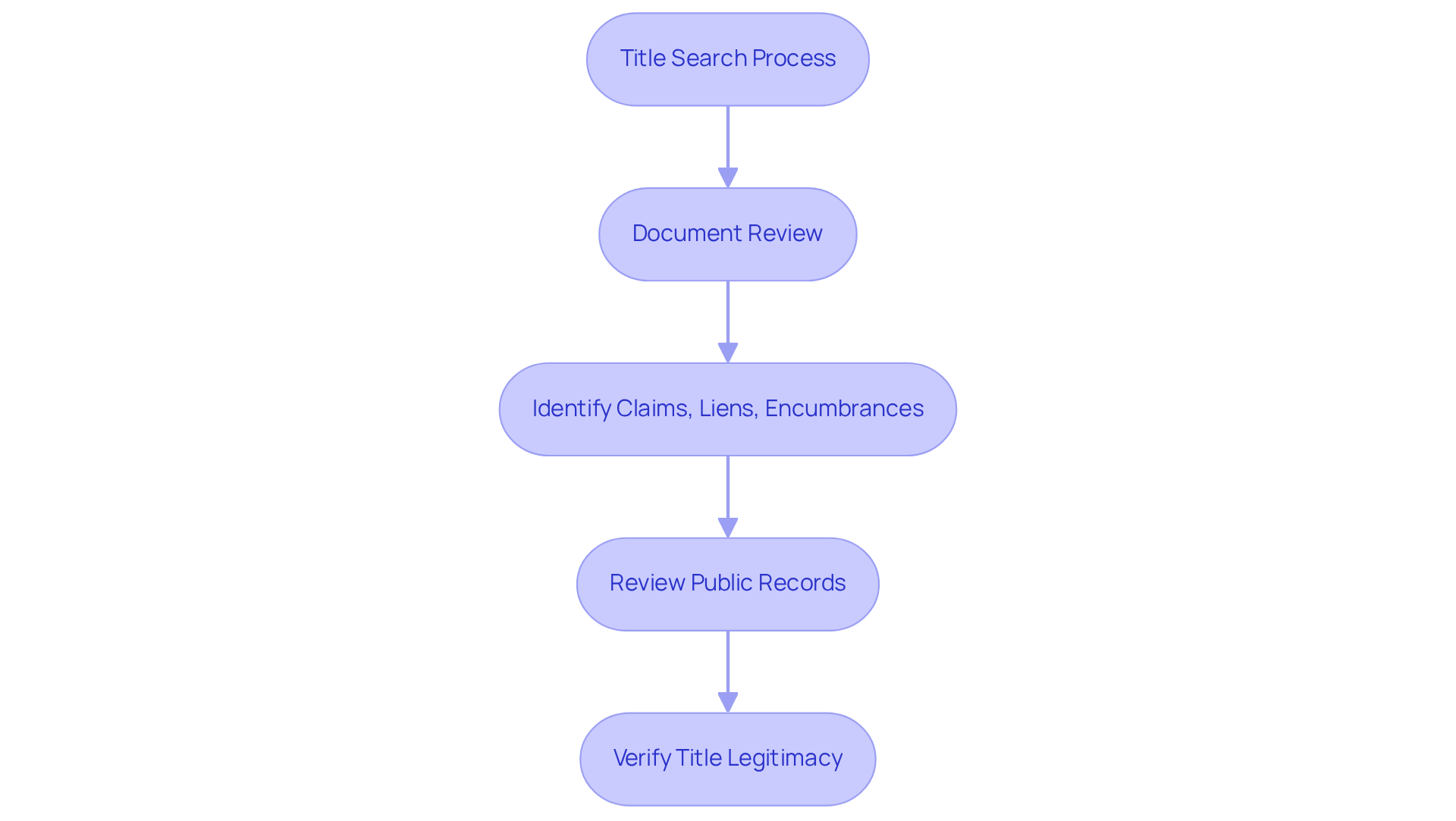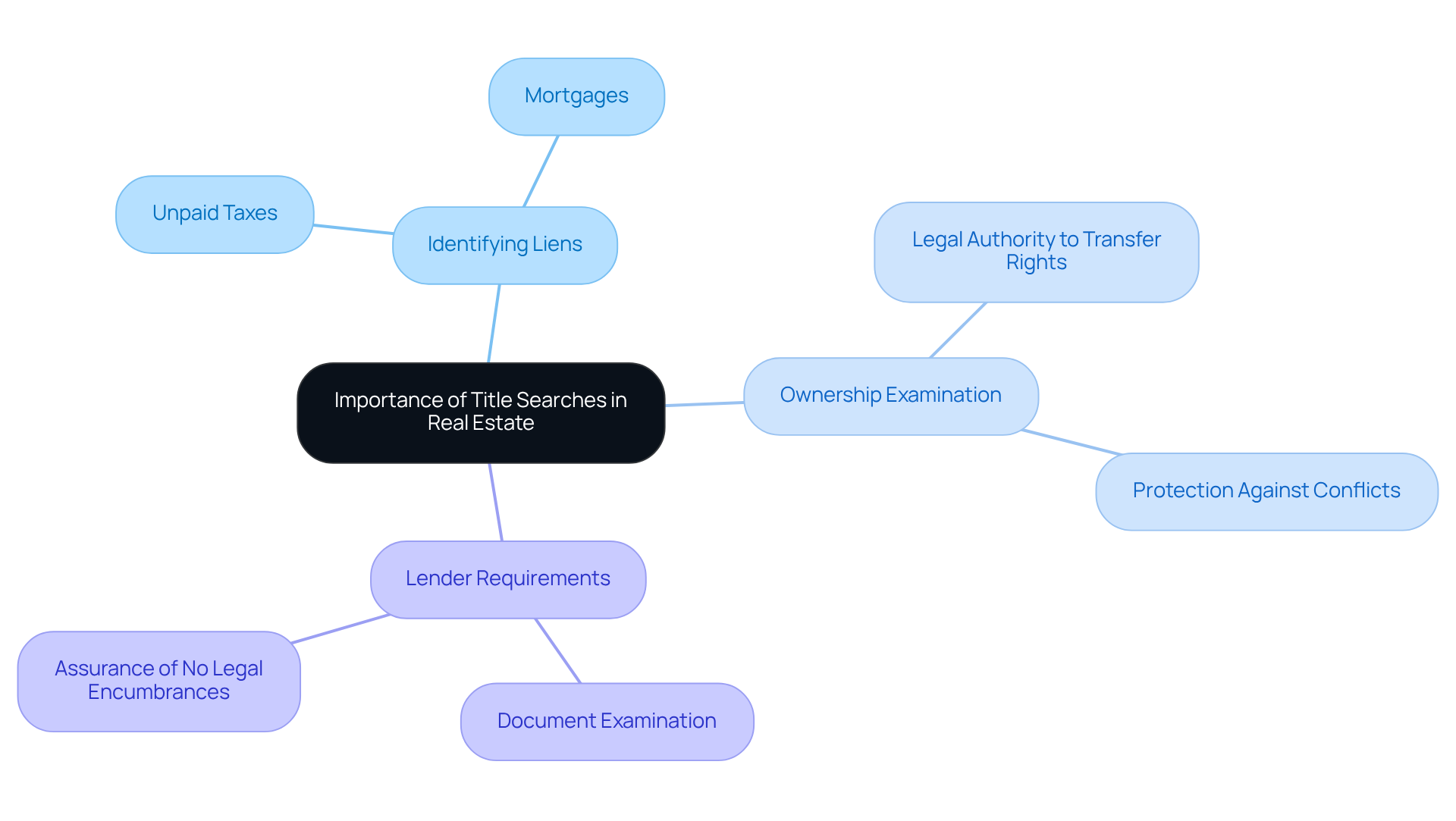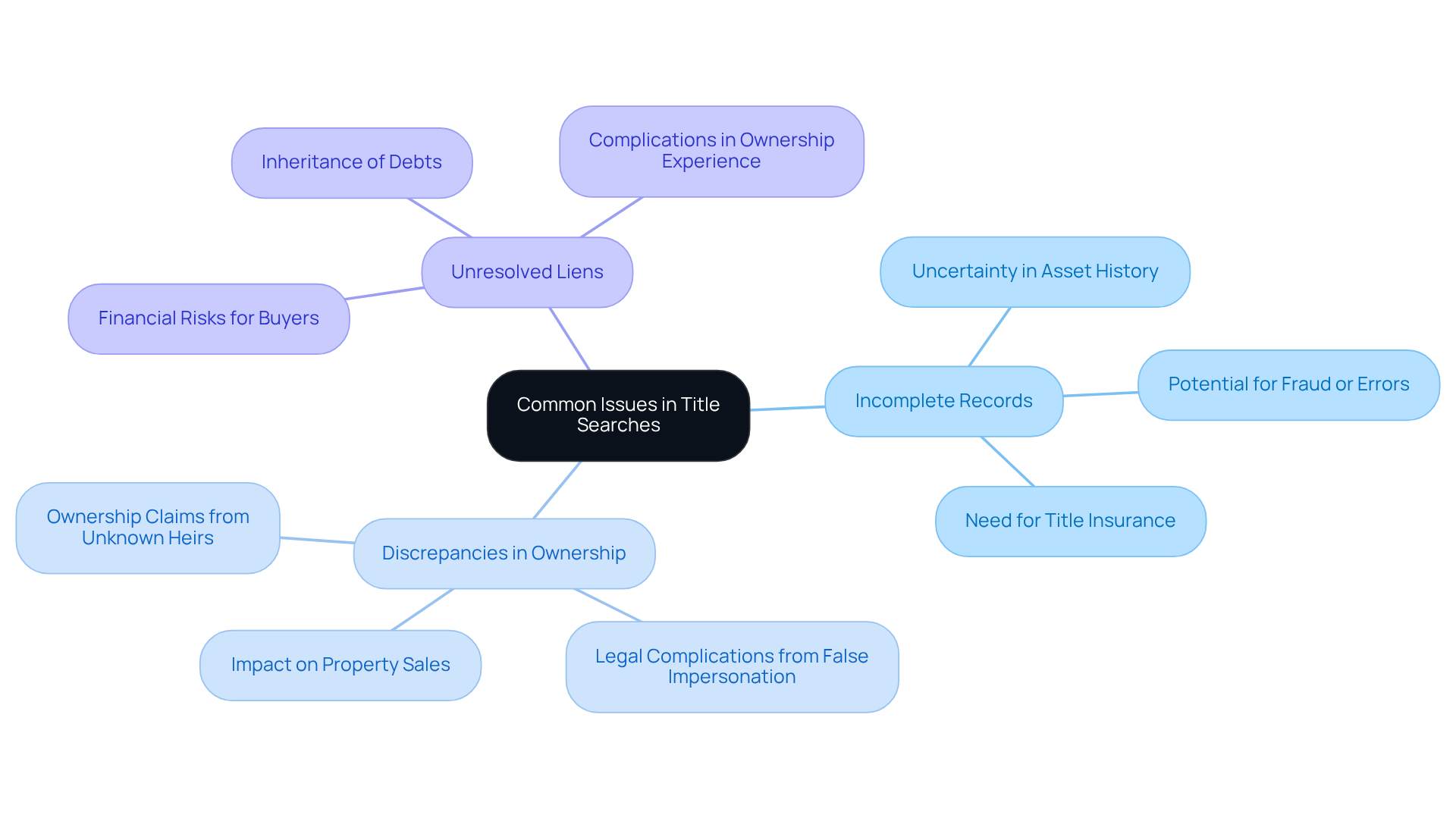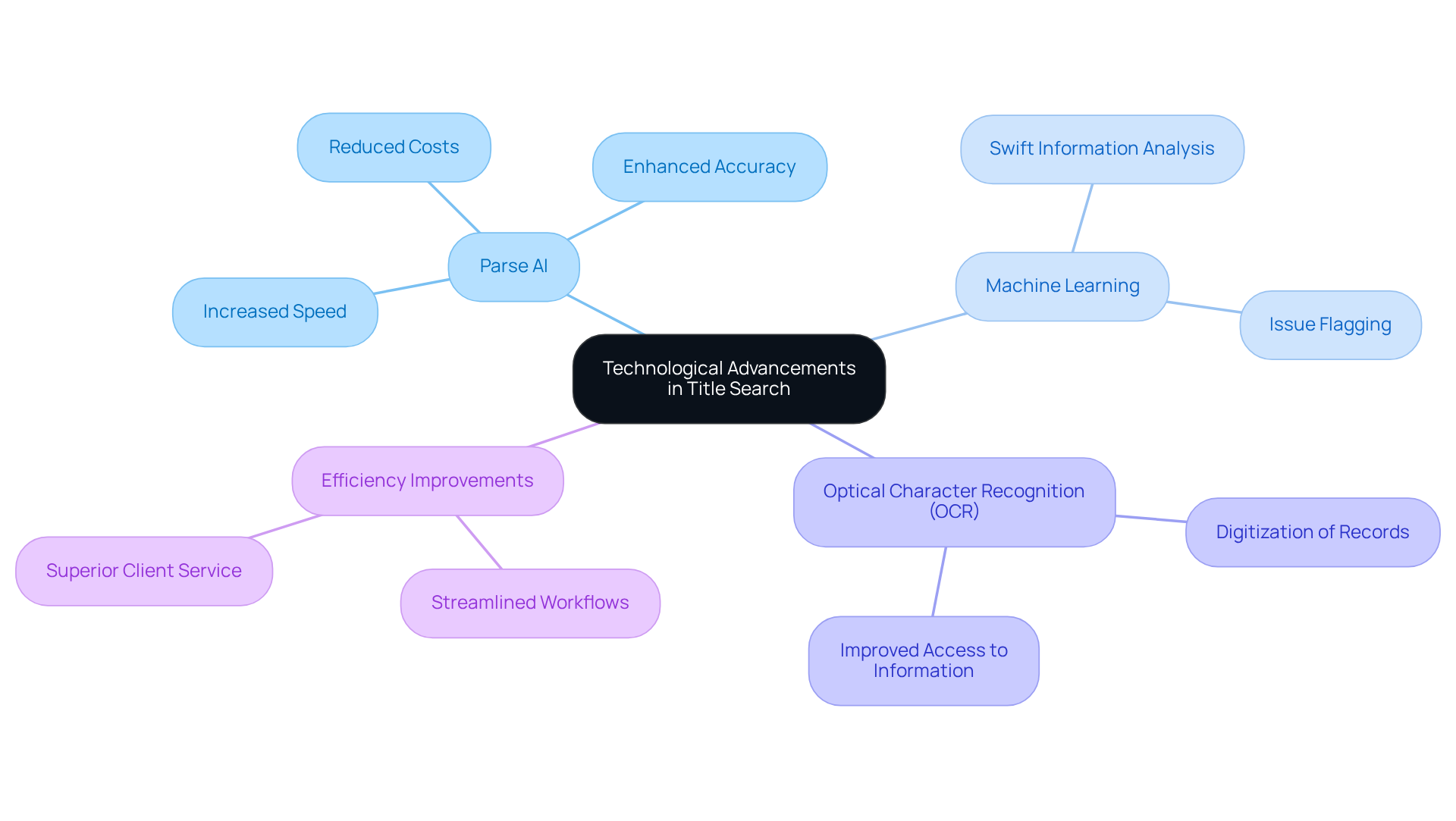Overview
A title search is an essential procedure in real estate that verifies legal ownership and identifies any claims, liens, or encumbrances affecting a property. This process ensures that the property can be transferred without disputes.
Thorough examination of documents is crucial, as it mitigates risks, protects buyers, and facilitates smoother transactions.
Furthermore, the importance of technological advancements cannot be understated; they significantly enhance the efficiency and accuracy of the title search process.
Introduction
Understanding the intricacies of real estate transactions is crucial for both buyers and professionals in the field. A title search serves as a fundamental step in this process, revealing essential information about property ownership and potential legal issues that could hinder a sale. Furthermore, with the increasing complexity of property records and the emergence of new technologies, real estate professionals face significant challenges in ensuring a seamless title search. This article delves into the significance of title searches, the common pitfalls encountered, and how innovative solutions are reshaping this vital aspect of real estate dealings.
Define Title Search: Understanding Its Role in Real Estate
A document review is a critical procedure conducted to ascertain the legal ownership of real estate and to understand what is a title search, as well as identify any claims, liens, or encumbrances that may affect ownership. This examination involves a thorough review of public records, including deeds, mortgages, and tax documents, ensuring that the asset can be legally transferred without disputes.
The document inquiry represents an essential phase in property dealings, supplying purchasers and financiers with vital details to make informed decisions regarding ownership and funding. By verifying the legitimacy of the title, estate professionals can mitigate risks associated with disputes and ensure compliance with legal requirements.

Explain the Importance of Title Searches in Real Estate Transactions
Title examinations are paramount in real estate transactions for several compelling reasons.
- They play a critical role in identifying any existing liens or claims against the property, such as unpaid taxes or mortgages, which could hinder the sale.
- An ownership examination ensures that the seller possesses the legal authority to transfer rights, thereby protecting the purchaser from potential conflicts.
- Furthermore, lenders often require a document examination prior to granting a mortgage, as it provides assurance that the property is free of legal encumbrances.
By conducting a thorough examination of property records, real estate professionals can facilitate smoother transactions, reduce the likelihood of legal disputes, and enhance buyer confidence in their investment.

Identify Common Issues Found During Title Searches and Their Implications
During document examinations, various frequent problems may arise, including:
- Incomplete or inconsistent records
- Discrepancies in ownership
- Unresolved liens
Incomplete documentation leads to uncertainty regarding the asset's history, while inconsistencies may indicate potential fraud or errors in previous transactions. Notably, a significant percentage of title searches reveal discrepancies that may suggest fraud or mistakes in earlier dealings, highlighting what is a title search and the critical need for diligence in this area. Unresolved liens can impose substantial financial risks on buyers, as they may inherit debts associated with the property, complicating their ownership experience. Understanding these matters is essential for estate professionals, who must be prepared to address them proactively.
Title insurance acts as a protective measure against ownership disputes, offering financial security in the event of unforeseen claims. Furthermore, collaborating with research specialists and utilizing advanced technologies can effectively mitigate these risks and ensure accurate verification. By proactively tackling these issues, real estate professionals can safeguard their clients' investments and streamline the closing process.

Explore Technological Advancements in Title Search Processes
Recent technological advancements have profoundly transformed the property search process, enhancing both speed and efficiency. Parse AI employs advanced machine learning algorithms capable of analyzing extensive volumes of document content, swiftly identifying pertinent information and flagging potential issues. Furthermore, our sophisticated optical character recognition (OCR) technology facilitates the digitization of paper records, enabling researchers to access and process information with greater efficiency. These innovations significantly reduce the time and capital required for what is a title search while also enhancing accuracy by minimizing human error. As real estate professionals increasingly adopt these technologies, including Parse AI's solutions, they streamline their workflows and provide superior service to clients, ultimately leading to more successful transactions.

Conclusion
Understanding the intricacies of a title search is essential for real estate professionals aiming to navigate property transactions smoothly. This critical process not only verifies legal ownership but also uncovers potential claims, liens, or encumbrances that could complicate ownership transfer. By ensuring a clear title, professionals can significantly reduce the risks associated with disputes and enhance buyer confidence.
The article highlights various key aspects of title searches, including:
- Their importance in identifying existing liens
- Ensuring seller authority
- The necessity for lenders
Furthermore, it addresses common issues encountered during title examinations, such as:
- Incomplete records
- Unresolved liens
This emphasizes the need for diligence in this area. Technological advancements are also transforming the title search process, allowing for greater efficiency and accuracy, which ultimately benefits all parties involved in real estate transactions.
In conclusion, the significance of conducting thorough title searches cannot be overstated. Real estate professionals are encouraged to leverage advanced technologies and collaborate with specialists to mitigate risks and streamline their processes. By prioritizing diligent title examinations, they can protect their clients' investments and foster a more secure real estate environment. Embracing these practices not only enhances transaction success but also builds trust and credibility within the industry.
Frequently Asked Questions
What is a title search in real estate?
A title search is a document review process conducted to ascertain the legal ownership of real estate and identify any claims, liens, or encumbrances that may affect ownership.
Why is a title search important?
A title search is important because it helps ensure that the asset can be legally transferred without disputes, providing vital information for purchasers and financiers to make informed decisions regarding ownership and funding.
What types of documents are reviewed during a title search?
During a title search, public records are thoroughly reviewed, including deeds, mortgages, and tax documents.
How does a title search mitigate risks in property dealings?
By verifying the legitimacy of the title, a title search helps mitigate risks associated with disputes and ensures compliance with legal requirements in property transactions.




